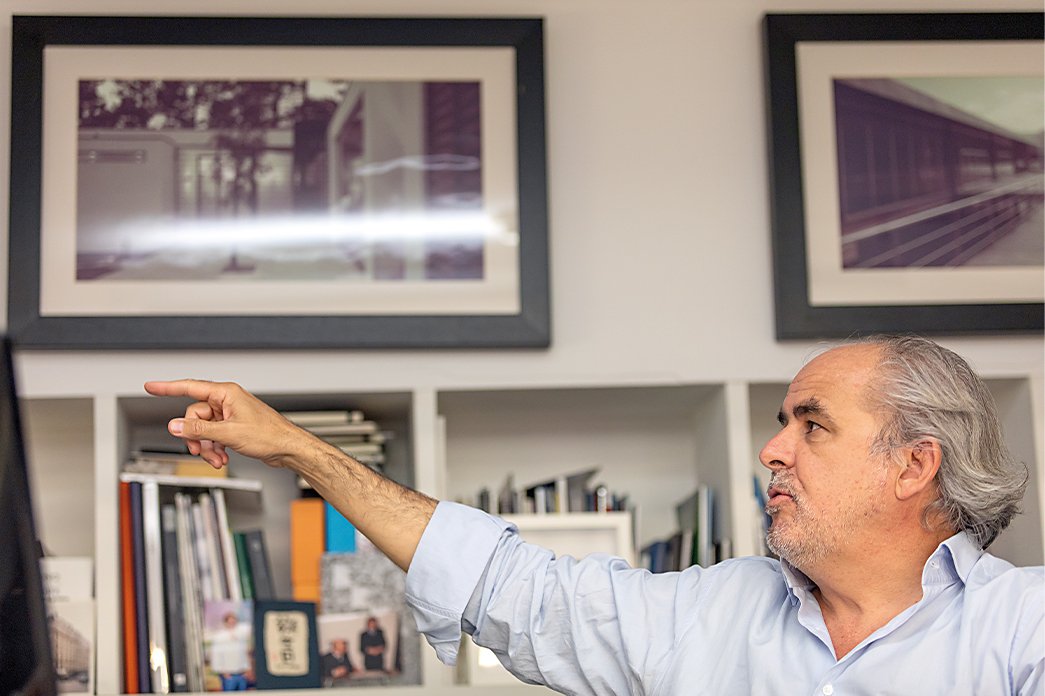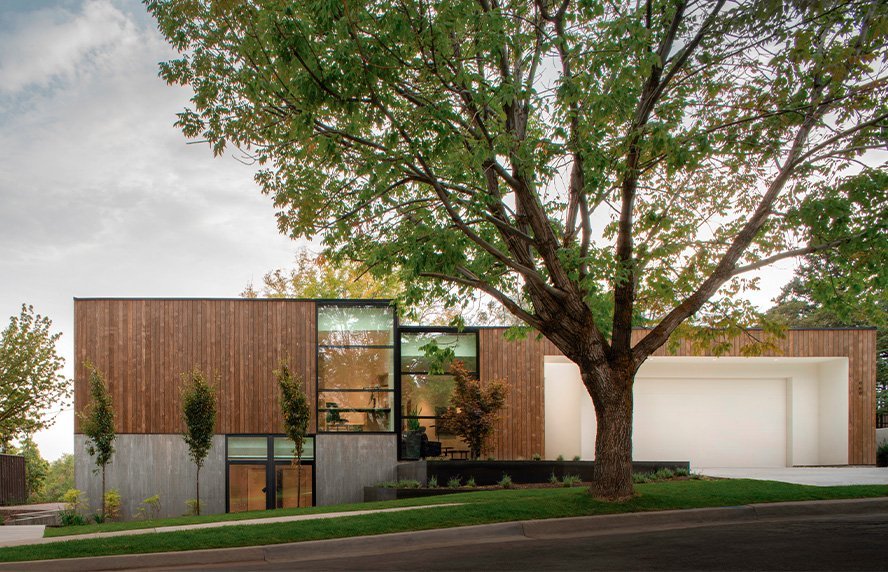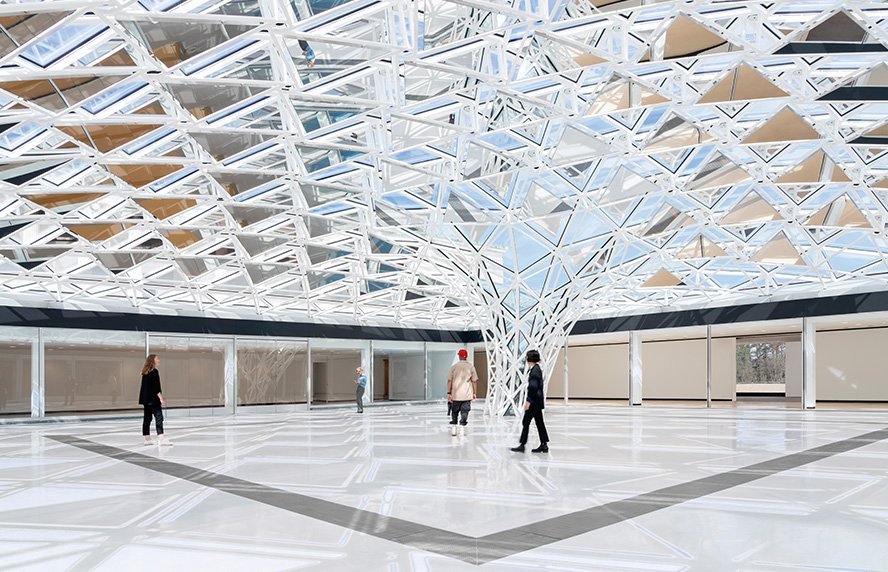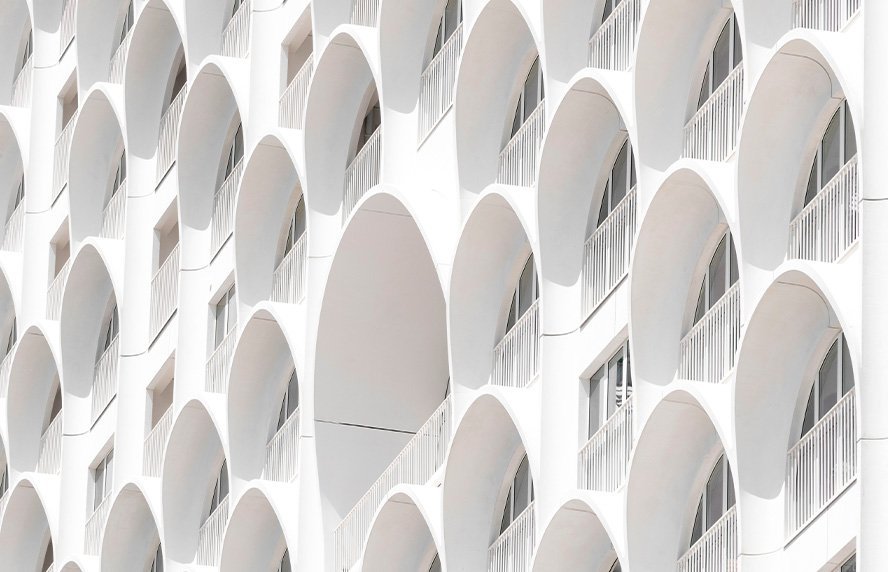
Hundreds of projects in Portugal and around the world have been designed by architect Miguel Saraiva, founder of Saraiva+Associados – the only Portuguese practice to feature in the World Architecture 100, which only includes the world’s largest. In his eclectic portfolio, there are houses, buildings, airports, places of worship, sporting venues, public utility and entertainment facilities and many others fundamental to the development of society, in which you can see the stages he has passed through in the course of his career, which began in the studio of architect and artist João Chichorro.
Was starting your career with João Chichorro a defining step for you?
I believe it was. I went to work with João Chichorro, after having been a driver – because I didn’t want to work as an architect, which was badly paid and unappreciated –, and I loved it. He was a man of the arts, first and foremost he was an interior designer, hugely cultured, and had a very beautiful style and very interesting ideas. My relationship with him was so close that it got me really interested in architecture again, with one advantage: it was well paid. But I worked at an impressive pace, I was so committed to what he asked of me that I worked day and night. It was an extraordinary experience.
What did you learn from that experience?
I started to develop a perfect sense of what it was like to design at 1/100 scale and build at natural scale. Mastering scale is the greatest challenge for architects. I would draw for him and accompany him on building sites, so I started to have a perfect notion of what I was doing, which was a huge professional challenge. He also worked a lot with texture and colour, which helped me to learn a lot about these expressions, something I abandoned for a while and which is now coming back.
Like artists, do you, as an architect, have phases?
Yes, of course, they come with maturity. Not only maturity of professional practice, but also as human beings. We evolve as we come into contact with clients, with the authorities that vet our work and approve our projects, with master builders and craftspeople... I really like talking to master tradesmen, they reveal to us the reality of the work and this teaches us and unravels the complexity we often have in our heads. Throughout the time I have had my own studio, which turned 25 in June, I have had three phases: a very short one, at the start of my career; then another one, which lasted ten years; and now I am completing another one, also of ten years. This current one is the most violent and the most intrusive in my personal and working life. My age and my years working force me to take a huge leap in terms of quality and, at this moment, I am being schizophrenically demanding of myself with regard to architecture. I know I have to have a single focus: quality, quality, quality.
Is sustainability important to you?
We bought a company in the sustainability sector and brought it into our universe and that company transformed the DNA of Saraiva+Associados when it comes to the sustainability paradigm. As such, sustainability is within us and it doesn’t clip our creativity. It might change the way we see situations a little, as it is a positive change that directly impacts on people’s lives and their quality of life. If we can work with natural materials, such as glass, steel, stone and also ceramics, we are not going to replace them with other materials.
"Renovating, for me, is about respectful silences, it’s about dialogues with the past"
What was the reason that led to the internationalisation?
Internationalisation was a choice we made. At one point we were in eleven countries, now we are in six, for financial reasons. When we set out for other locations, it was also for financial reasons. The crisis in our country led us to other markets so that the studio could continue to operate and not lose professional practice. Without designing, we lose our hand and, if we lose our hand, we lose scale and, if we lose scale, we lose content and, if we lose content, we stop being architects. But opening these studios was also about creating opportunities and commission cycles and, because of this, we always had a straight line on the graph – we didn’t grow or decrease – which allowed us to feed eighty architects for eight years. It was a great challenge. In 2014, there were 90% commissions abroad and 10% at home; today it’s the other way around. The greatest asset we brought back from those countries was the professional practice carried out in different ways than we do in Portugal, which is now part of our DNA. That has proved an added value, hence enhancing the studio.
Do you like renovating more or building from scratch?
I think it is more difficult to build from scratch than to renovate. For most architects a blank sheet is a challenge, but also a reason for anguish, not to say that it is scary. Renovating, for me, is about respectful silences, it’s about dialogues with the past. Doing renovation projects is a unique opportunity, working with materials from the past, adding contemporary materials to them in a structured way. I think it is more difficult to design a tower from the start, although I like both situations. From my perspective, architecture is increasingly pervasive in society. And it is also true that we have to join our skills to other professionals so that what we do and design becomes more complete, less complex, more functional and serves people better.
How would you characterise your style?
I think it is a very austere style. So my lines are very purist lines. I’m not in the habit of disowning my work and I see myself in all of them and I like to revisit them to see what didn’t go well and improve in the future. And, therefore, my great challenge and my great work in the future is to improve all that I have done until now and this is a bow I take to my own work, a bow of respect for me, for those who work with me, for those who have worked and for those who will work.
Was starting your career with João Chichorro a defining step for you?
I believe it was. I went to work with João Chichorro, after having been a driver – because I didn’t want to work as an architect, which was badly paid and unappreciated –, and I loved it. He was a man of the arts, first and foremost he was an interior designer, hugely cultured, and had a very beautiful style and very interesting ideas. My relationship with him was so close that it got me really interested in architecture again, with one advantage: it was well paid. But I worked at an impressive pace, I was so committed to what he asked of me that I worked day and night. It was an extraordinary experience.
What did you learn from that experience?
I started to develop a perfect sense of what it was like to design at 1/100 scale and build at natural scale. Mastering scale is the greatest challenge for architects. I would draw for him and accompany him on building sites, so I started to have a perfect notion of what I was doing, which was a huge professional challenge. He also worked a lot with texture and colour, which helped me to learn a lot about these expressions, something I abandoned for a while and which is now coming back.
Like artists, do you, as an architect, have phases?
Yes, of course, they come with maturity. Not only maturity of professional practice, but also as human beings. We evolve as we come into contact with clients, with the authorities that vet our work and approve our projects, with master builders and craftspeople... I really like talking to master tradesmen, they reveal to us the reality of the work and this teaches us and unravels the complexity we often have in our heads. Throughout the time I have had my own studio, which turned 25 in June, I have had three phases: a very short one, at the start of my career; then another one, which lasted ten years; and now I am completing another one, also of ten years. This current one is the most violent and the most intrusive in my personal and working life. My age and my years working force me to take a huge leap in terms of quality and, at this moment, I am being schizophrenically demanding of myself with regard to architecture. I know I have to have a single focus: quality, quality, quality.
Is sustainability important to you?
We bought a company in the sustainability sector and brought it into our universe and that company transformed the DNA of Saraiva+Associados when it comes to the sustainability paradigm. As such, sustainability is within us and it doesn’t clip our creativity. It might change the way we see situations a little, as it is a positive change that directly impacts on people’s lives and their quality of life. If we can work with natural materials, such as glass, steel, stone and also ceramics, we are not going to replace them with other materials.
"Renovating, for me, is about respectful silences, it’s about dialogues with the past"
What was the reason that led to the internationalisation?
Internationalisation was a choice we made. At one point we were in eleven countries, now we are in six, for financial reasons. When we set out for other locations, it was also for financial reasons. The crisis in our country led us to other markets so that the studio could continue to operate and not lose professional practice. Without designing, we lose our hand and, if we lose our hand, we lose scale and, if we lose scale, we lose content and, if we lose content, we stop being architects. But opening these studios was also about creating opportunities and commission cycles and, because of this, we always had a straight line on the graph – we didn’t grow or decrease – which allowed us to feed eighty architects for eight years. It was a great challenge. In 2014, there were 90% commissions abroad and 10% at home; today it’s the other way around. The greatest asset we brought back from those countries was the professional practice carried out in different ways than we do in Portugal, which is now part of our DNA. That has proved an added value, hence enhancing the studio.
Do you like renovating more or building from scratch?
I think it is more difficult to build from scratch than to renovate. For most architects a blank sheet is a challenge, but also a reason for anguish, not to say that it is scary. Renovating, for me, is about respectful silences, it’s about dialogues with the past. Doing renovation projects is a unique opportunity, working with materials from the past, adding contemporary materials to them in a structured way. I think it is more difficult to design a tower from the start, although I like both situations. From my perspective, architecture is increasingly pervasive in society. And it is also true that we have to join our skills to other professionals so that what we do and design becomes more complete, less complex, more functional and serves people better.
How would you characterise your style?
I think it is a very austere style. So my lines are very purist lines. I’m not in the habit of disowning my work and I see myself in all of them and I like to revisit them to see what didn’t go well and improve in the future. And, therefore, my great challenge and my great work in the future is to improve all that I have done until now and this is a bow I take to my own work, a bow of respect for me, for those who work with me, for those who have worked and for those who will work.











